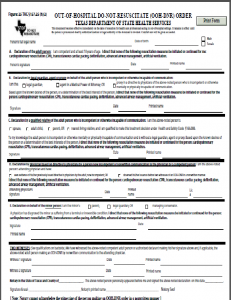Texas Health and Safety Code Chapter 166, Subchapter C, provides for the out-of-hospital Do-Not-Resuscitate Order (“DNR”). DNRs are fairly common among elderly or terminally ill patients, and, because improper compliance or non-compliance with the DNR can expose both the EMT and the EMS provider to civil and criminal liability, it is vital that EMTs know how to comply with DNRs pursuant to Texas law.
What does a DNR look like?
What does a DNR do?
It directs health care professionals acting in an out-of-hospital setting to withhold cardiopulmonary resuscitation and certain other life-sustaining treatment.
Could anyone have a DNR?
Yes. A competent person may at any time execute a written DNR order. The signature must have two witnesses’ signatures or be acknowledged before a notary public. Additionally, the attending physician must sign the order. Under certain circumstances, a physician, proxy, or medical power of attorney may sign a DNR order on behalf of another person. The order is effective immediately upon its execution.
A DNR can also be executed on behalf of a minor by a parent, legal guardian, or managing conservator if the minor has been diagnosed by a physician with a terminal or irreversible condition.
Is a copy of the original acceptable?
Provided there is nothing independently suspicious about the photocopy, yes.
What if a patient desires that their DNR not be followed?
The desire of a competent person, including a competent minor, supersedes the effect of a DNR order when the desire is communicated to responding health care professionals.
What do I do if I encounter an Out-of-Hospital DNR in the field?
- Establish the identity of the person as the person for whom the DNR was executed or issued.
- Determine that the DNR form includes:
- written responses in the places designated on the form for the names, signatures, and other information required of persons executing or issuing, or witnessing or acknowledging as applicable, the execution or issuance of, the order;
- the date the order was executed or issued; and
- the signature or digital or electronic signature of the declarant or persons executing or issuing the order and the attending physician in the appropriate places designated on the form for indicating that the order form has been properly completed.
- If these conditions are not met, the DNR order should not be honored and life-sustaining protocols should be initiated or continued.
- The DNR form should accompany the person during transport.
Are there any special circumstances where I should disregard a valid DNR?
Yes. Initiate or continue CPR or other life-sustaining treatment if someone on scene who identifies themselves as the declarant or as the attending physician, legal guardian, qualified relative, or agent of the person having a medical power of attorney who executed or issued the DNR order on behalf of the person requests that CPR or other life-sustaining treatment be initiated or continued.
Do DNR Identification Devices have the same effect as DNR orders?
Yes. A person with a valid DNR order may wear a DNR identification device around the neck or on the wrist. The presence of a DNR identification device is conclusive evidence that the person has a valid DNR. You should honor the DNR identification device as if a valid DNR were found in the possession of the person.
Does a valid DNR have an expiration date?
No, it is effective until it is revoked.
How is a DNR order revoked?
A declarant may revoke a DNR at any time without regard to the declarant’s mental state or competency by:
- the declarant or someone in the declarant’s presence and at the declarant’s direction destroying the order form and removing the DNR identification device, if any;
- a person who identifies himself or herself as the legal guardian, as a qualified relative, or as the agent of the declarant having a medical power of attorney who executed the out-of-hospital DNR order or another person in the person’s presence and at the person’s direction destroying the order form and removing the DNR identification device, if any;
- the declarant communicating the declarant’s intent to revoke the order; or
- a person who identifies himself or herself as the legal guardian, a qualified relative, or the agent of the declarant having a medical power of attorney who executed the out-of-hospital DNR order orally stating the person’s intent to revoke the order.
If you have knowledge that a DNR order has been revoked, record the time, date, and place of the revocation. If you disregard a revocation of which you have actual knowledge, you may be held civilly or criminally liable for failure to act on the revocation.
Does honoring a valid DNR constitute a criminal offense?
No. You do not commit a criminal offense by merely withholding CPR or certain other life-sustaining treatment pursuant to a valid DNR.
What amounts to a criminal offense?
A person commits a criminal offense if the person intentionally conceals, cancels, defaces, obliterates, or damages another person’s DNR or DNR identification device without that person’s consent or the consent of the person or persons authorized to execute or issue the DNR on behalf of the person.
A person is subject to prosecution for criminal homicide if the person, with the intent to cause CPR or certain other life-sustaining treatment to be withheld from another person contrary to the other person’s desires, falsifies or forges a DNR or intentionally conceals or withholds personal knowledge of a revocation and thereby directly causes CPR and certain other life-sustaining treatment to be withheld from the other person with the result that the other person’s death is hastened.
Are DNRs valid as to pregnant persons?
No. You may not withhold CPR or certain other life-sustaining treatment from a person known by you to be pregnant.
